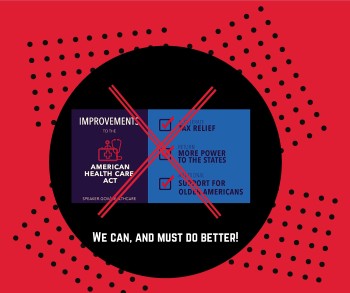How the House’s American Health Care Act bill Threatens Youth Justice Reform

By Marcy Mistrett, CEO
While the Senate will debate their healthcare bill early next week, concerns have already risen with the incredibly cruel health care reform bill narrowly passed by the House of Representatives earlier this month, along solid party lines. The depth of the damage isn’t yet known, as the House voted on the American Health Care Act (AHCA) without hearings, without a CBO score, amidst threats from the Administration….but early estimates predict that as many as 24 million people are going to lose their healthcare benefits (more than half of whom are on Medicaid).
Many of the losses will include those with pre-existing conditions (whose healthcare costs are expected to rise astronomically) and those who depend on Medicaid to treat their health needs ($880 billion slashed over the next decade). While this, in and of itself, should be leading to protests in the street, there are other reasons that people in the youth justice system should care (and oppose these reforms with their U.S. Senators vociferously):
- States have reduced the number of youth in secure custody by investing in community based alternatives. Many of these alternatives and diversion programs rely on health coverage to pay for supportive mental health and medical services (e.g. family therapy, trauma therapy, cognitive behavioral therapy, etc). The AHCA provides waivers to states to exempt them from covering essential health benefits (which in many placescould result in health plans opting out of covering essential health benefits including mental health services). By slashing funding for services provided in the community, counties and states could return to the “you can get the help your child needs if we just arrest him/her” era, driving up the numbers of youth who are unnecessarily incarcerated.
Children should not need an arrest to get necessary services.
- People with disabilities are the largest recipients of Medicaid dollars. Under AHCA, schools may not be able to access scarce Medicaid dollars for critical school-based services for children with disabilities such as occupational therapy, speech therapy, etc.
If schools can’t get paid for offering intervention services that help children with disabilities succeed in school, they may stop providing them. This includes children with behavioral, mental health and physical needs. Without supports, we know all too often, our children (particularly our children of color) end up getting their disabilities “punished”; leading far too many to get court referrals. It is estimated that more than 65% of children in the justice system meet the criteria for a disability; a percentage that is three times the national average.
All children deserve the supports they need to learn –in schools, not in prisons.
- Under the ACHA, states will have the option to end coverage of the essential health benefits required under Obamacare. The Affordable Health Care Act bars lifetime caps for the essential health benefits; so if a state no longer requires insurers to cover these benefits, then lifetime caps can once again be put in place, which we know impact children who have grown up poverty-condensed communities, and who are exposed to violence and trauma—the same children that are over represented in our justice system.
To avoid these increased costs, families may be forced to avoid medical diagnoses that establish a pre-existing condition, leaving child trauma and health unaddressed.
Early intervention matters. Children deserve to get the medical interventions they need to heal from exposure to trauma or other medical conditions.
States and counties have worked hard to build front end, evidence based practices that support families, address underlying trauma, and stabilize children in their communities. This has contributed to record low arrests, and children and families getting services they need up front, with positive outcomes for both them and public safety.
By slashing safety nets, while slashing taxes for the wealthy, we will not solve anything. We can, and must do better.

